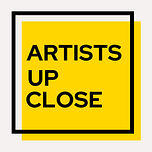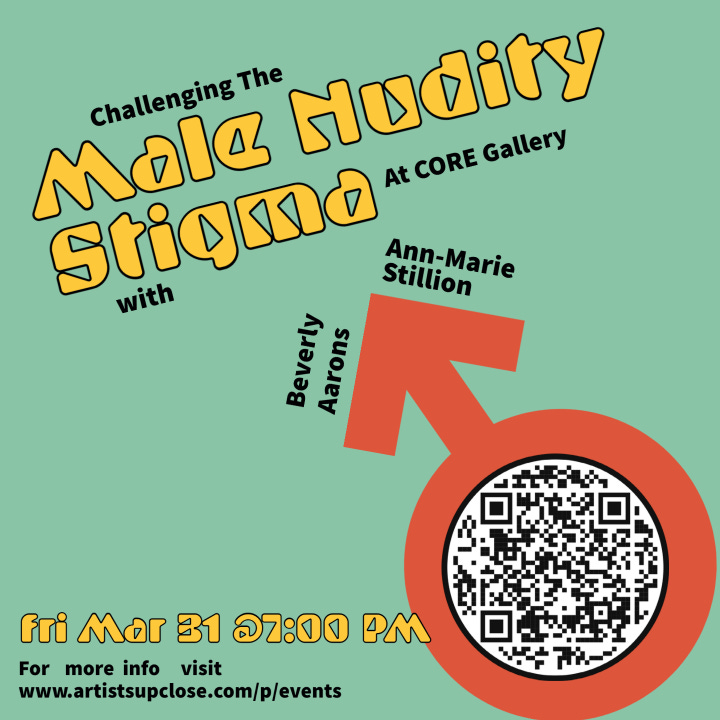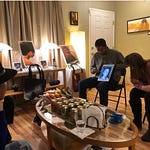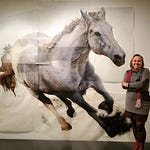Ready to challenge the way we view male nudity? Listen to this exclusive sneak-peak audio interview between writer Beverly Aarons and photographer Ann-Marie Stillion as they discuss the male nudity taboo.
How do men really feel about their bodies?
What does nudity say about power?
How would our society change if there was no male nudity taboo?
Want to learn more, go deeper, and share your own thoughts about the male nudity taboo? Join Beverly Aarons and Ann-Marie Stillion on Friday, March 31st at 7p at CORE Gallery. Tickets are $25. Seating is limited. Buy now.
Non-alcoholic drinks and snacks will be served. This event will be recorded.
Interview Transcription:
Beverly Aarons
This is Artists Up Close. This month, I have a special treat for all of my subscribers. Earlier this month, I met a really interesting person, incredible photographer, Ann-Marie Stillion. I bumped into her in core gallery, because I was hanging out as I do. And we struck up a conversation and really connected and we decided to do an event on March 31st, at 7pm at CORE Gallery, she has an exhibition of her work there. And she does these absolutely incredible photos of male nudes. So this month, I am going to share with you a brief interview that I did with Ann-Marie. And hopefully, you'll get a little taste of what we're going to discuss on March 31st. You go over and purchase a ticket to come in and join us and have a good time with us. Without further delay, here's Ann-Marie Stillion on Challenging The Stigma of Male Nudity, interviewed by myself, Beverly Aarons, the founder of Artists Up Close
Ann-Marie Stillion
Photographing the nude, to me, it seemed, didn't seem like that big of a deal. And what it says about society, to me is nudity has to do or who's nude and who's not, has to do with who's in power. I've actually had when I shoot in the studio with models and out in nature. And I've actually had people come up to us while I was shooting and photographing and say, 'Hey, wait a minute. You're not supposed to be doing this. He's supposed to be doing this.' I mean, yeah, total strangers in the middle of nowhere, informing me about who's supposed to be working here, who's supposed to be doing what role. You know, it's strictly because I'm a woman and he's a man. So um, it just, I didn't really start out as this some kind of psychological or sociological study, but it just kept hitting me in the face that you know, somehow, the fact that no matter where I look in the world, there's a naked woman, whether she's selling makeup, or a movie, or in a movie, or on a jar or on the back of a truck, you know, the little flaps on the back of the truck. I, in my mind, I like flip the switch. And I'm like, all the time saying to myself, 'What if, no matter where I looked, there were naked men? Not that we should do that. So back to your question. What it says about society is who's in control.
Beverly Aarons
So when you have the power to unrobe a person, symbolically or literally, you are the person in power. You say covered. Right? No one can see your secret places. Right? Interesting. Do you think that society is at all aware that this is a practice of power? That showing the the female nude body everywhere while concealing the male body, is a reflection of who's empowered? Do you think that people understand that on some level?
Ann-Marie Stillion
On some level, everyone does, of course, because we're buying into it. You know, in the world politically right now they're taking away a woman's very right to control her body in medical ways. So, no, it's very much a part of it's a part of the background, though. I recently, very late in life began to read Carl Jung, and he very much addresses this, you know, there's the conscious, there's the conscious human being and then there's the unconscious. And unconsciously, these are the rules of power for all of us.
Beverly Aarons
And how do you think that your work impacts that power dynamic?
Ann-Marie Stillion
Well, right away, it's in front of you. Because when people -- my studio is at Equinox Studios in Georgetown in Seattle, and we have monthly open studios, and I participate in all of them. I haven't in the last few months, because, you know, I broke a leg and have to stay out. But I'm there every month normally. And people come into the studio. And of course, some people just leave because they're not used to seeing a naked man. But a lot of people are really happy and excited, men and women, to be able to experience-- people bring their children, and on purpose because they want their children to be exposed to the male or female body in a healthy way, and in a beautiful, artistic way. I've had this happen many times. So yeah, I think it has all kinds of really... and then we talk, you know, people don't just walk into typically, at least in my around me, you know, I'm open to engaging. So we have conversations about what would it be like, if you could really be in the world, as a man, and be comfortable with, you know, be happy with your body in a way that women really are encouraged to be. In many ways, I mean, I'm not saying I don't know what the answer is to this, I just know what I've experienced in my process of photographing and exhibiting and seeing the results of exhibiting, I mean, when I, the very first series I did was...
Beverly Aarons
Aren't as comfortable with their bodies, and the way that women are encouraged, I am interpreting that as, as you saying that women are more comfortable showing their body to the world than men are. And so I wanted to dig a little bit deeper into that. Do you believe that a lot of men are not comfortable showing their body because they don't really they don't see their body represented? Because you see male body like the ripped. You know, like that's, that's it, you don't really see anything else that you know that that ripped six pack? You don't get to see any other type of male body. So do you think that is part of it? Or do you think it's mostly something else?
Ann-Marie Stillion
No, it's exactly what you just said men are not allowed encouraged to think of their bodies as beautiful. This is this is sort of something I started, even when I was working as a journalist. And I was working in an Asian community. I was the only Caucasian on an Asian newspaper. And the writers and other photographers would come in and throw pictures of usually of Asian men on my desk. But they weren't very good. They weren't very good photographs. And so I began I actually have, it's, you can see it on my new website. I put an older series on there, called Asian Guy's Hair. To me, the Asian men that I was photographing, were beautiful. So I made it a point whenever I did my photojournalism thing, to always render Asian men as beautifully as I could, and eventually did an art series with that. But even now, people will say, when I'm in my studio, they'll say, 'Well, I don't have the right body.' 'I'm too fat,' or 'I'm too this' or 'Oh, no, I couldn't do that.' I'm like, I know, at least for me, my intention is to render whomever I'm photographing as beautifully as I can. My models are not all perfect, but, but I render them in a way that I am sharing them in a beautiful way. I don't show them in a bad way, in a bad light. You know, I use the best views or whatever, because beauty matters to me. If it's a man or a woman. But we don't have that attitude about men. We don't have the idea. And men don't have the idea that they would be loved simply for being themselves. I would argue that women, as a woman, I think It's fair to say most of us have been encouraged to believe that just being ourselves is a beautiful thing. Now, I don't want to get into the arguments about that. But we have that value about us as females. But we can have the same point of view about men. And I imagine in my artistic view view, I imagine I think about how the world would be, if men could just be appreciated for themselves, not because they can lift something heavy or, you know, solve 20 math problems or whatever. But just for being, and I feel like like that comes through in my photographs.
Beverly Aarons
Thank you for listening to Artists Up Close. And thank you for being a subscriber. Join us on Friday, March 31, at 7pm at CORE Gallery in Pioneer Square. This isn't just some artists talk where me and Ann-Marie sit down and talk at you. This is interactive, it's immersive, It's going to be a full discussion where we're talking and you're talking, you're asking us questions, and you're telling us what you think about the stigma of male nudity, what you think about the photographs that you're looking at because all of her work is going to be on displa when we're at the event at CORE Gallery on March 31. Come join us.













